Welcome to
On Feet Nation
Members
-
Maria Online
-
-
Blog Posts
Top Content
Free Download Field Of Glory: Empires .exe
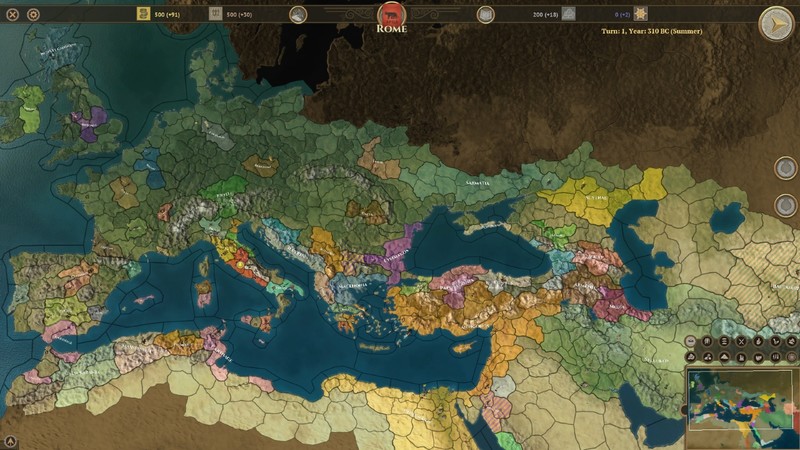
About This Game
Civilizations come and go; common men and kings they get covered by the dust of time in the same way. Monuments and wonders crumble under their own weight. But the cultural legacy is not bygone. Stories and tales about ancestors and their deeds pass through generations, the old knowledge is not lost forever. Soon, new societies, new kingdoms, new civilizations rise from the seeds of the ones which predated them. Decadence is not the end.Will your legacy stand the test of time?

Field of Glory: Empires is a grand strategy game in which you will have to move in an intricate and living tapestry of nations and tribes, each one with their distinctive culture.
Set in Europe and in the Mediterranean Area during the Classical Age, experience what truly means to manage an Empire.

Expand your dominion through wars of conquest and make your culture a beacon of light, but be careful though. The risk of Decadence is not trivial. Many civilizations have collapsed for not having seen in time the signs of impending crisis. The older your empire, the more challenges will lurk in the shadows. Just expanding your borders without carefully shaping your form of government and culture won’t be the wisest of strategies.

Manage your Empire on a scale that fits you: adjust all the details of an important region, form provinces to oversee your growing realm.

Construct buildings to enhance your army, the life of your citizens, and the economy. Establish and grow a trade network of goods and resources.

The battle system is not just about who brings the larger force. Army composition and understanding the strengths and weaknesses of you and your enemy are decisive, so is choosing wisely the battlefield and the general to lead your troops.

And, if you want even more direct control, Field of Glory: Empires lets you export and load your battles into Field of Glory II and then load the results back into Field of Glory: Empires!

War is decided not just by battles though, but also clever manoeuvres. Simultaneous (WEGO) turn resolution means thinking ahead to intercept – or to escape! – enemy armies will be essential. Field of Glory: Empires offers a living world where every decision has an impact on every actor.

And once you think you are ready to be challenged, play against real opponents in one of the largest asynchronous multiplayer system ever created. 1075eedd30
Title: Field of Glory: Empires
Genre: Strategy
Developer:
Ageod
Publisher:
Slitherine Ltd.
Franchise:
Field of Glory
Release Date: Coming Soon
English,French,German
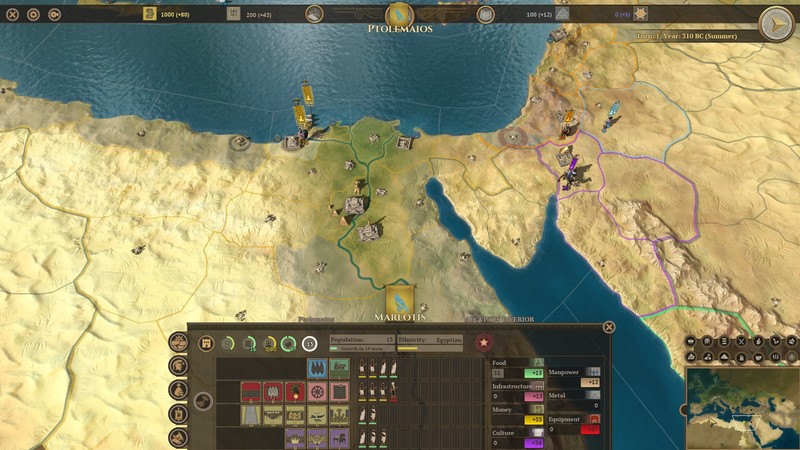
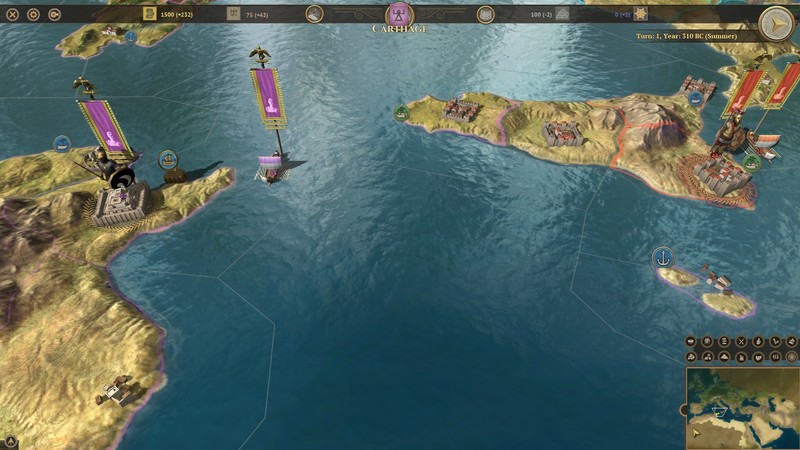
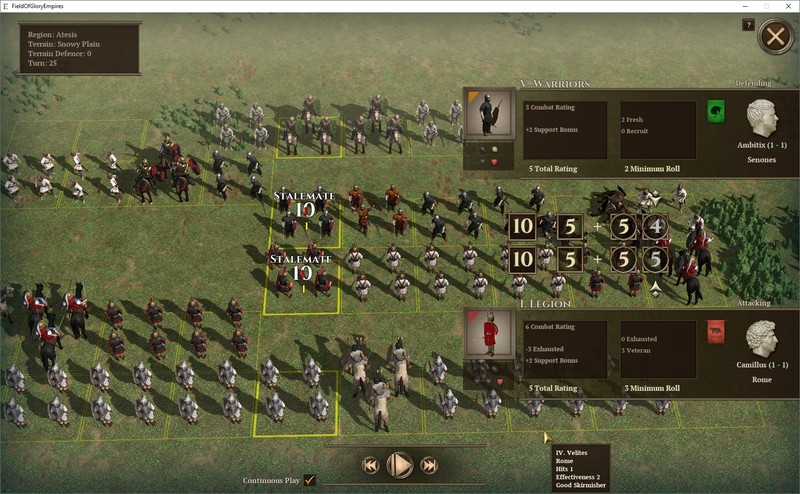
field of glory empires review. field of glory 2 empires. field of glory empires of the dragon pdf. field of glory empires skidrow. field of glory empires forum. field of glory clash of empires pdf. field of glory empires challenge. field of glory empires - ageod. field of glory empires beta. field of glory empires release. field of glory eternal empire. field of glory empires gameplay. field of glory empires wiki. slitherine field of glory empires. field of glory empires. field of glory empires pc. field of glory empires release date. field of glory empires dev diary. field of glory empires steam. field of glory empires vs imperator rome. field of glory eternal empire pdf. field of glory empires download
Field of Glory: Empires - Ranking and videos:
We have the final list of the participants who completed the Challenge #1 – Conquer Italy playing as Rome in as few turns as possible.
It was a bitter fight and many valorous soldiers have died trying. But what are they compared to the sempiternal glory of Rome?
This is the final ranking, kudos to all the participants!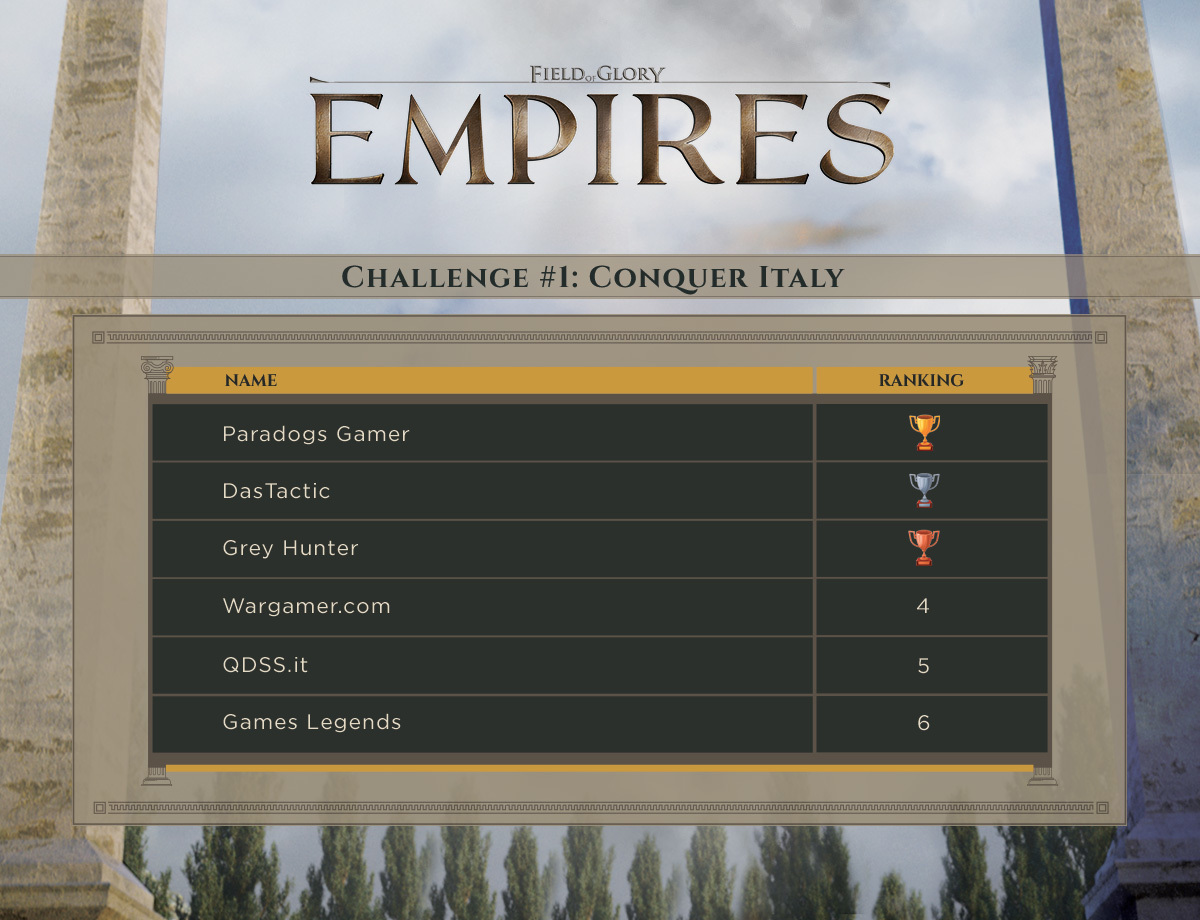
Read here for the full entry[slitherine.com]
. Field of Glory: Empires Dev Diary #8 - Legacy:
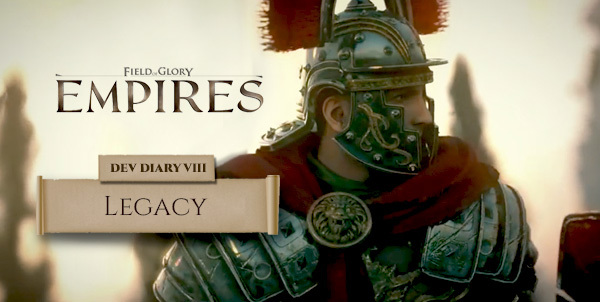
Winning the Game
In Empires, you are building your nation so that it endures the passage of time, and your achievement is measured through the legacy you’ll leave, even if in the end, your nation is no more.
There are several ways to achieve this goal of being first in Legacy. It’s not just something to be only achieved by conquering part of the map, although that approach remains a possibility, rest assured.
If you take a military approach, then you’ll want to plan your campaigns so that you conquer and hold your objective regions. These regions are set for each nation and represent loosely their historical progress or areas of interest. Some nations will have objectives set in a concentric way, around their capital, so they will expand outward in each direction.
Other nations have several possible ‘tracks’ to follow, and when they get an objective in one of the tracks, then they are provided with another.
For example, Rome has a track that represents its progress against Carthage, including Spain and Africa. Another track will let the Republic fight Epirus, Macedon and then go to Asia Minor, and so on.
Another possible approach to gaining Legacy is to make your regions very cultured, so that they produce legacy points by themselves. There are two levels here, and both demand substantial investment in the right buildings and decisions with the second level being quite a challenge to achieve. But if you devote your nation to the creation of prestigious buildings, it’s a possibility.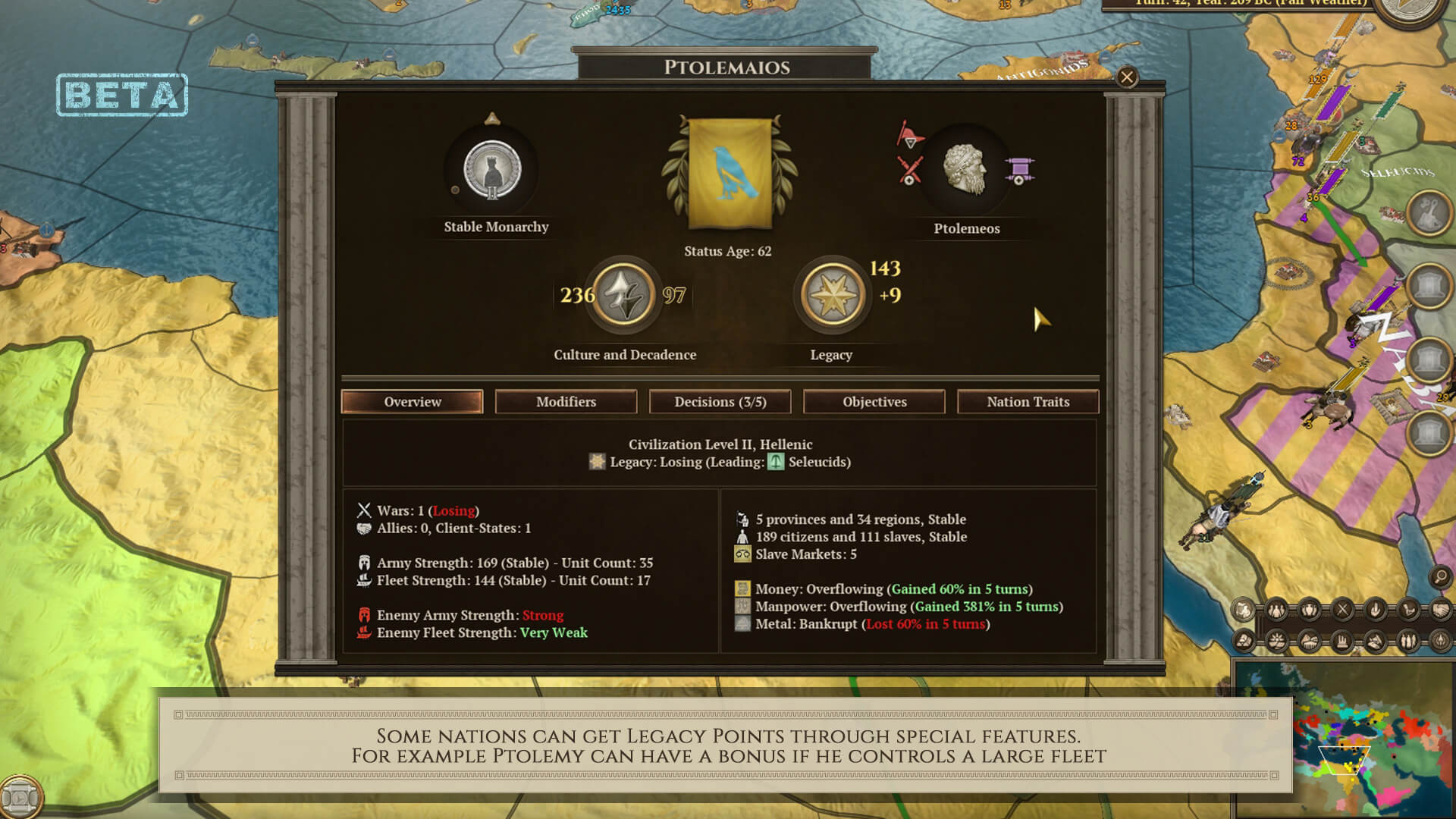
Yet another option is to pursue actively those national decisions that provide Legacy Points. These can include domestic reforms, or mounting a far away expedition to the border of the known world.
A final way to generate legacy is to try enduring the difficulty of managing a nation past its glory. Like Sparta perhaps, that clung to life for centuries well beyond its climax. This has no doubt left a lasting impression to the future generations, as few people know nothing about Sparta, even nowadays. Practically speaking, when your government is old or decadent, each turn you manage to survive the vicissitudes happening to your nation, then a significant amount of Legacy Points will be given.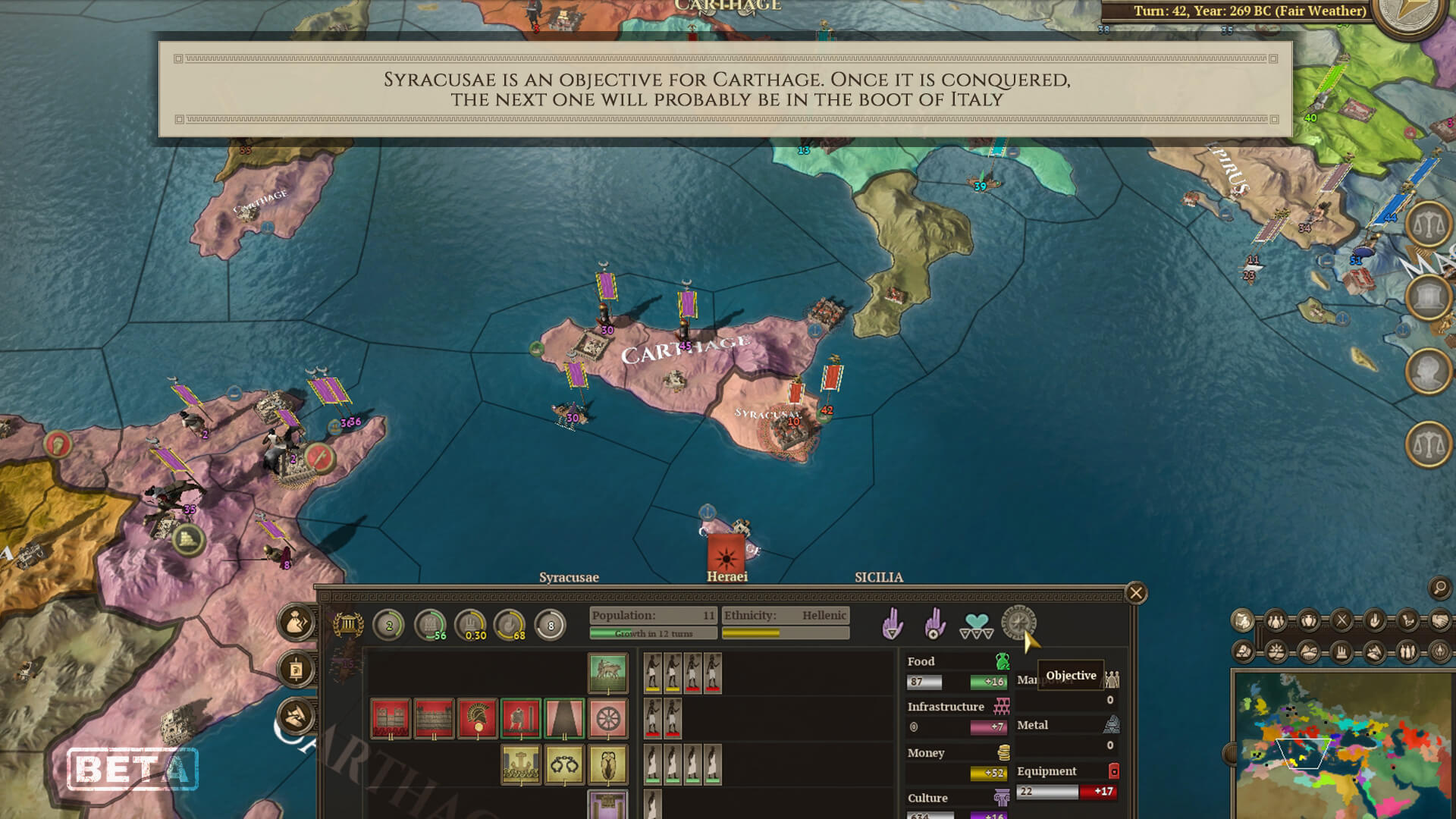
If you can build, and sustain, a substantial legacy lead it is possible to win the game before its actual end-date of 190 CE. This might reward a high risk strategy where you try to gain legacy quickly and accept the inevitable problems such a focus will bring. A modern equivalent of the traditional Spartan instruction to ‘return with your shield or on it’? Equally possessing substantial amounts of legacy will help you during the game as there are a number of rewards to being seen as an impressive state by your contemporaries.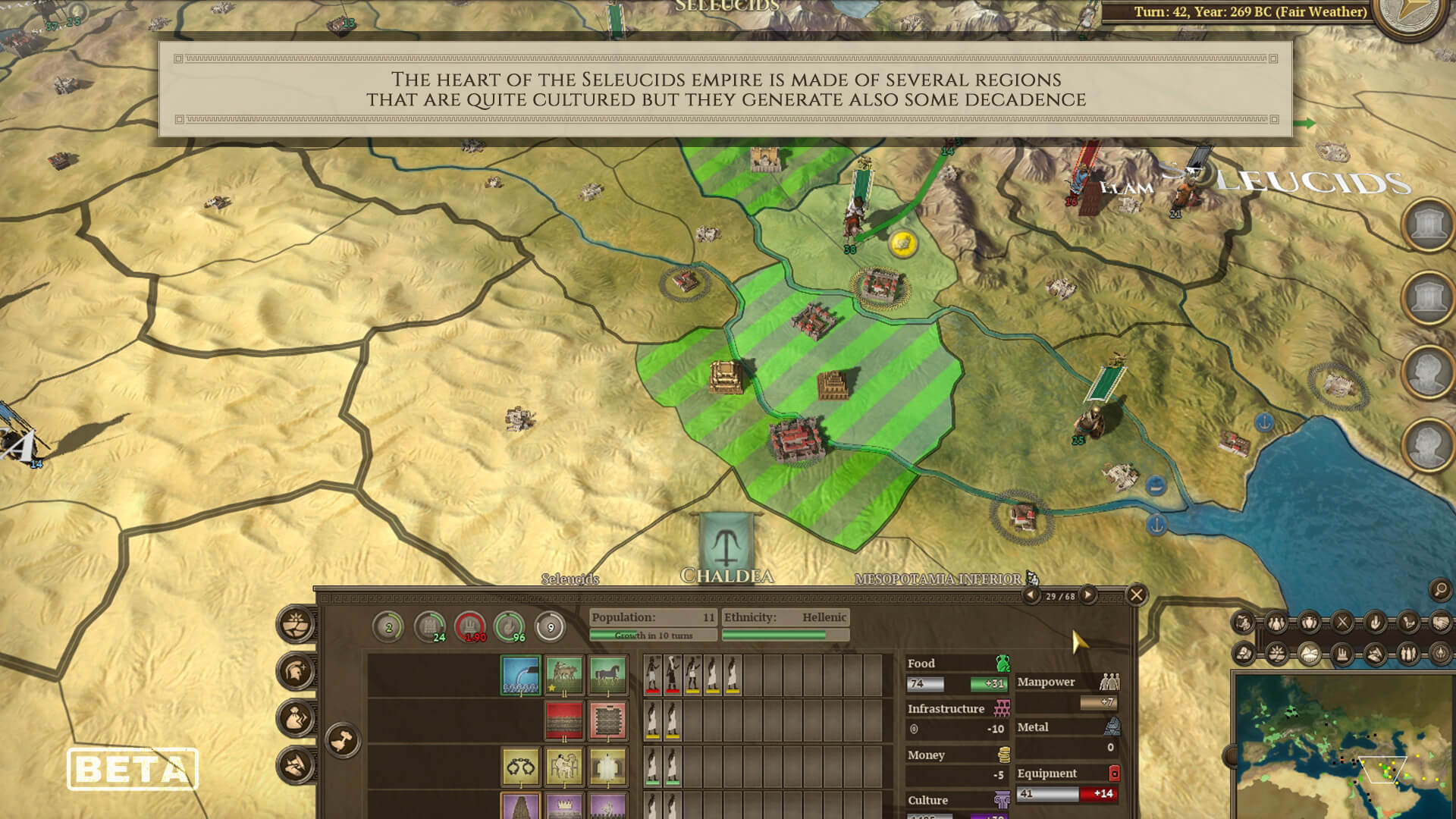
So the game is much more about painting the map in your color. Even if in the end all nations are trying to generate more legacy than their rivals, you can still get these points from different approaches, although admittedly it is probably better to try a balanced approach perhaps with a focus on one.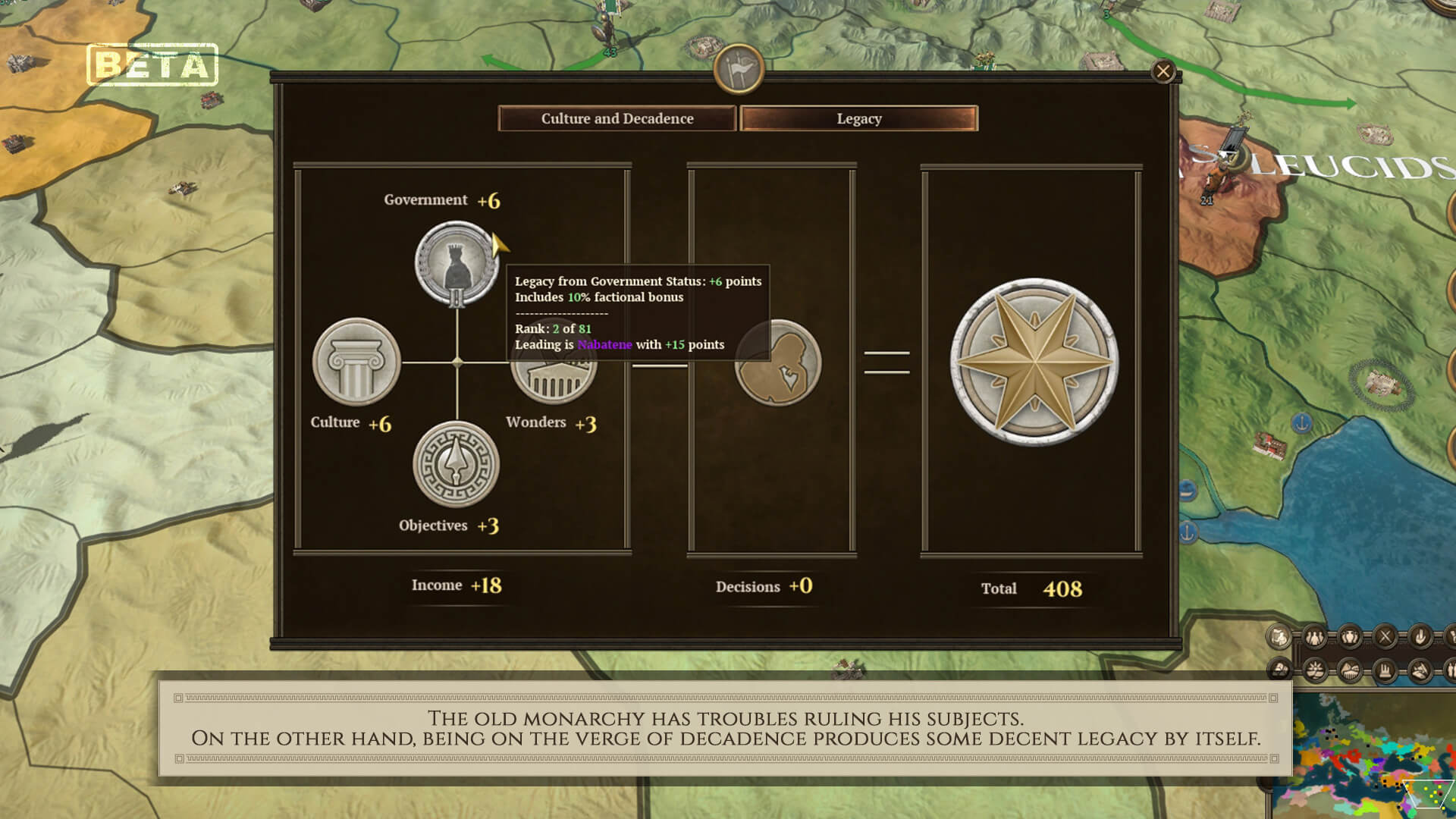 . New Screenshots Part II - Ask anything about them!:
. New Screenshots Part II - Ask anything about them!:
It's time for another group of screenshots, highlighting some unique features and mechanics. The developer will answer every question about them! Every question!
Stay tuned for further updates!
Click on the screenshots to see them in full size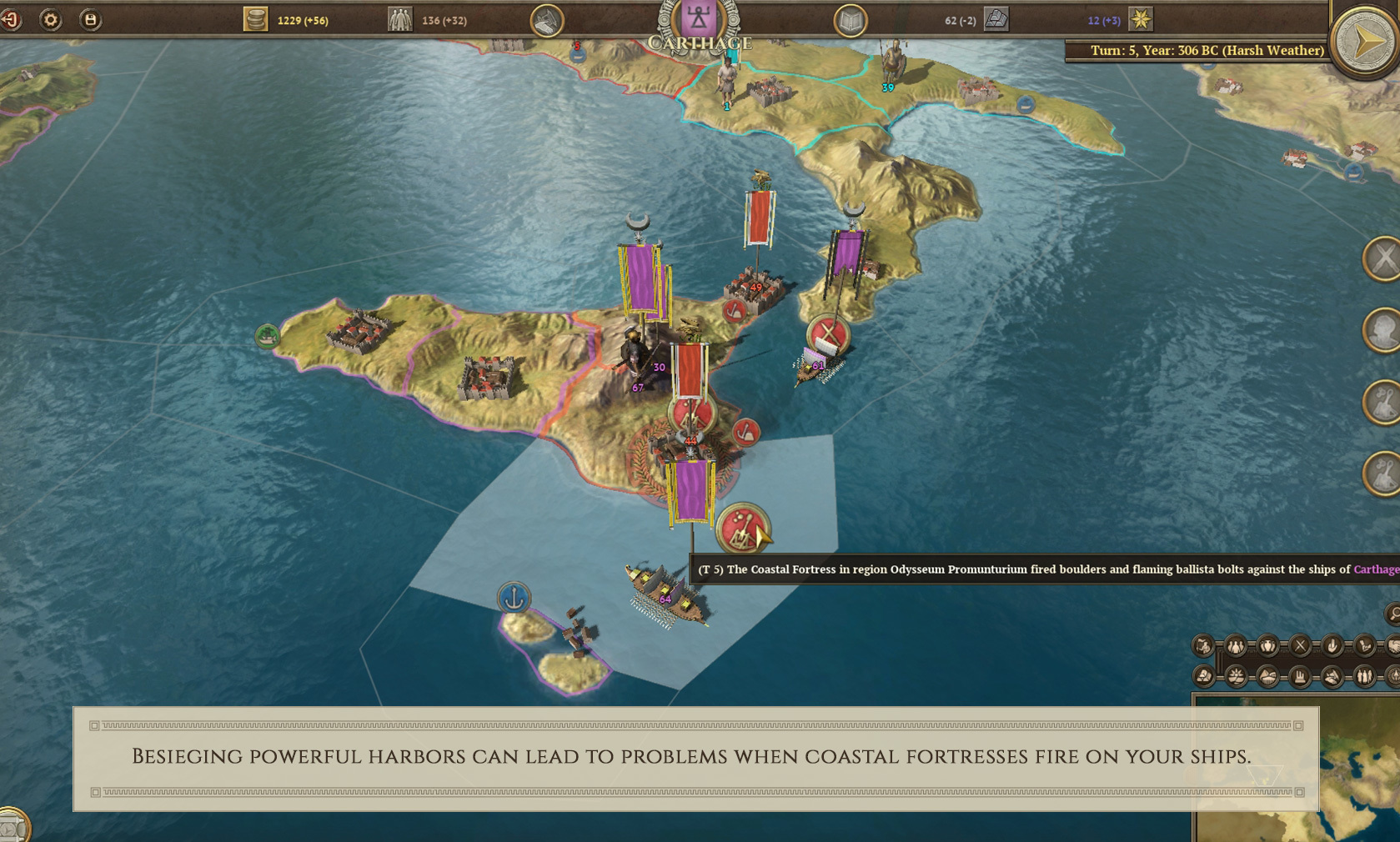 [www.matrixgames.com]
[www.matrixgames.com]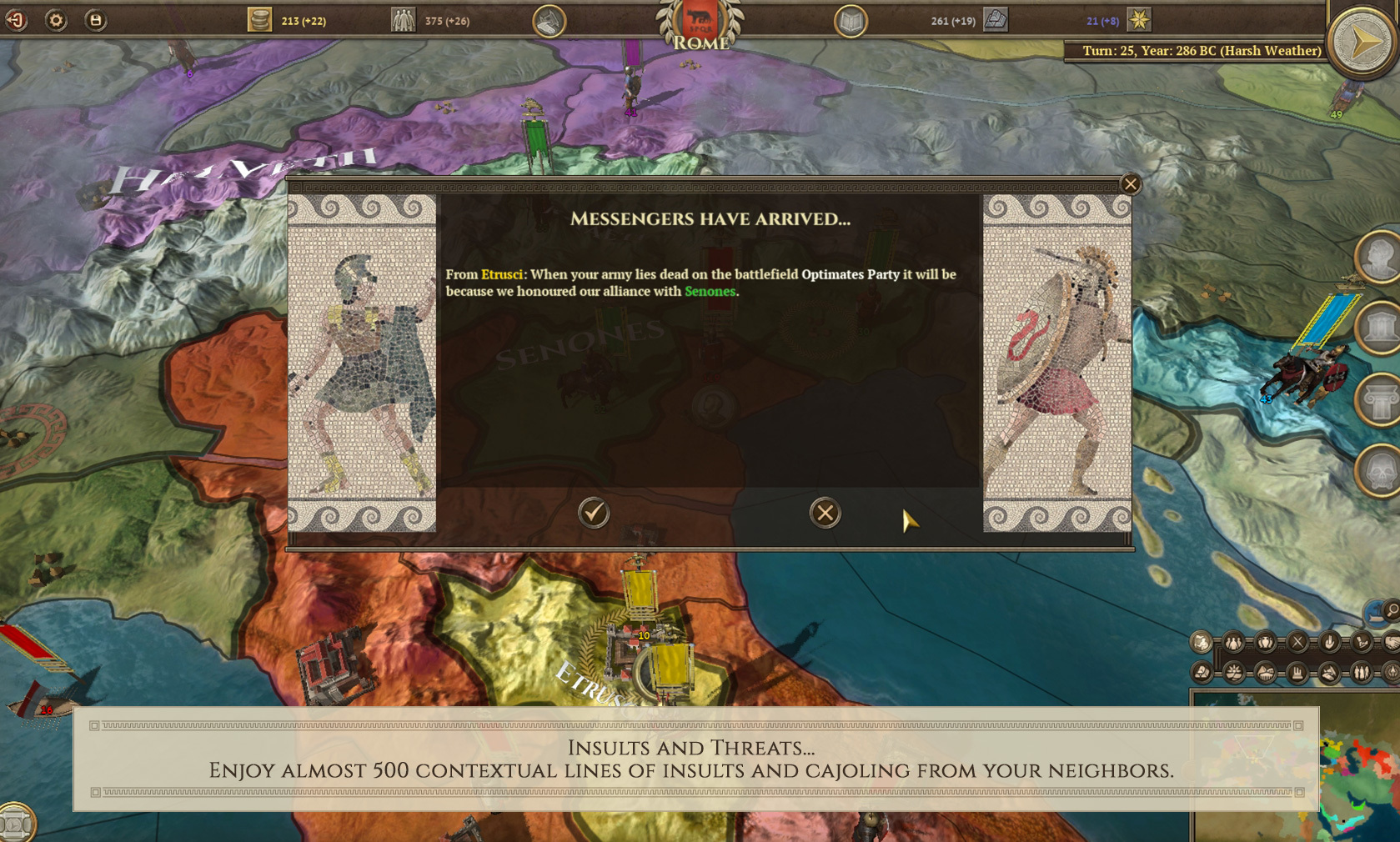 [www.matrixgames.com]
[www.matrixgames.com]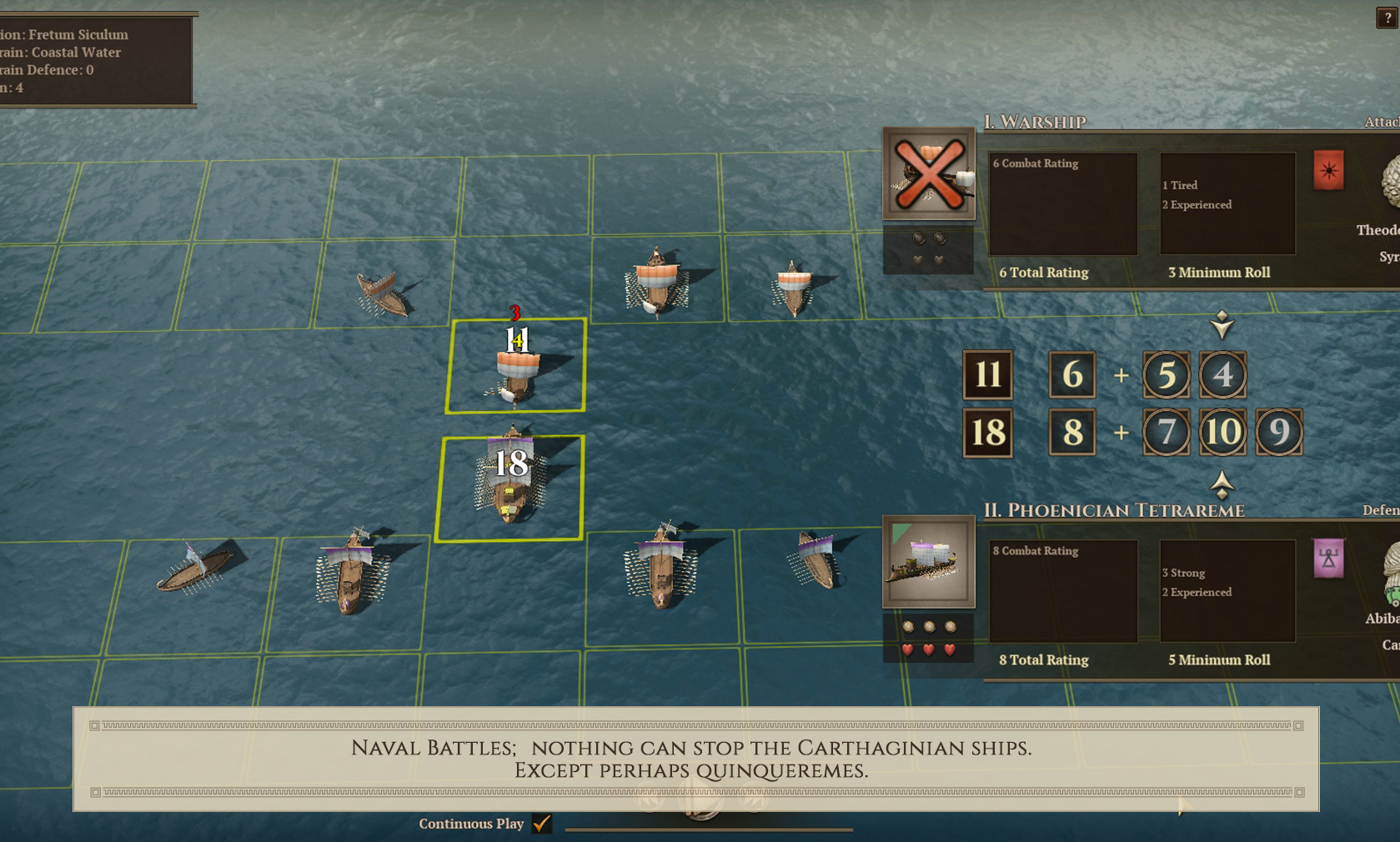 [www.matrixgames.com]
[www.matrixgames.com]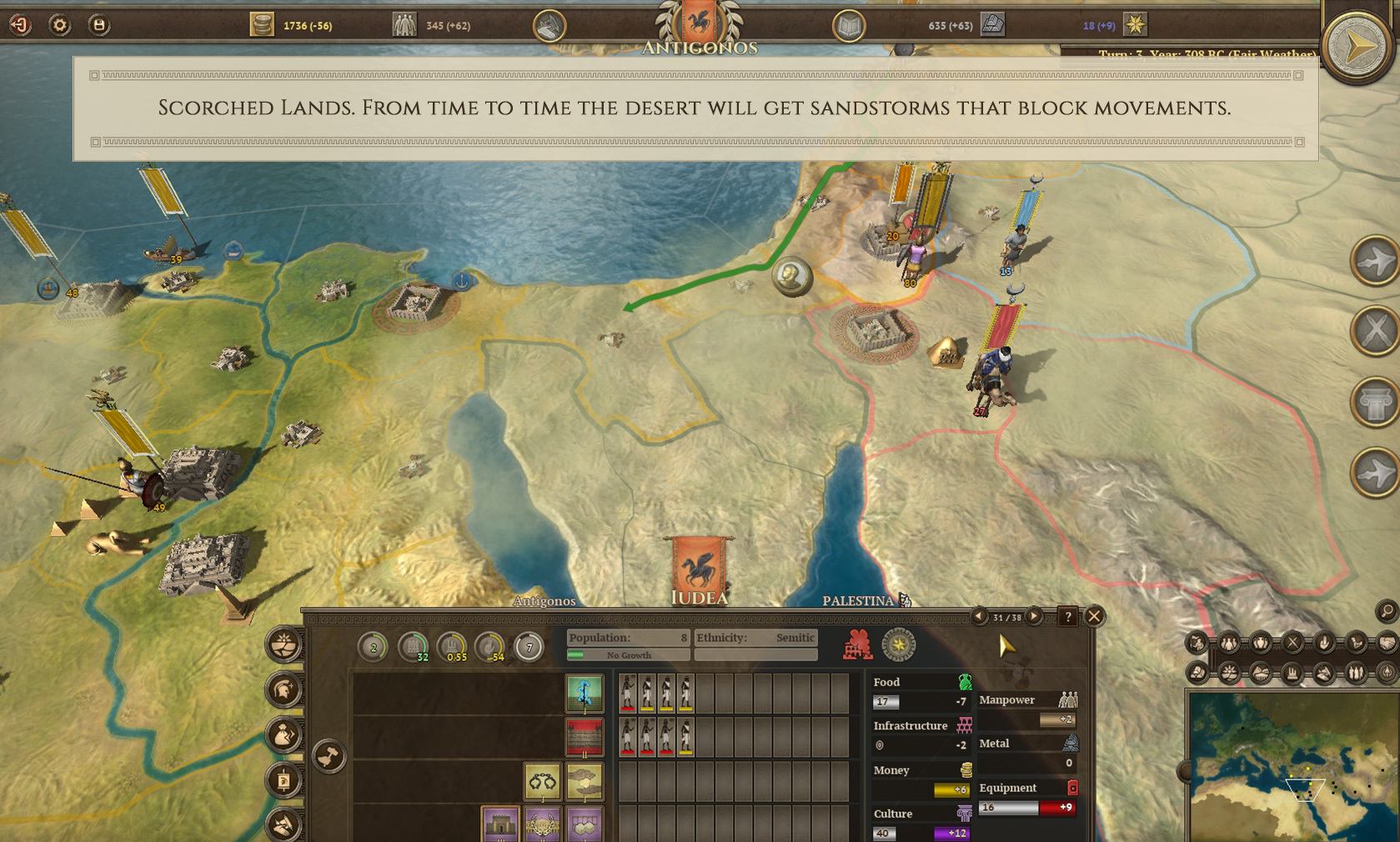 [www.matrixgames.com]
[www.matrixgames.com]
. Dev Diary #6 - Culture and Decadence:
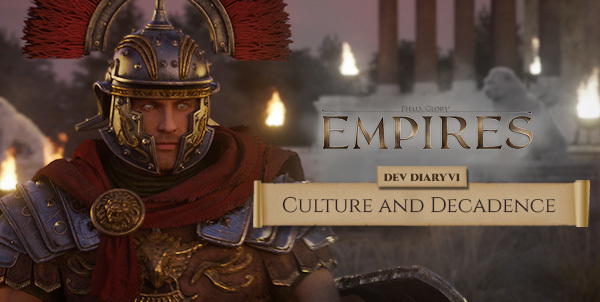
One key feature in Empires is how it deals with the progress and decline of nations. This impacts how your empire will evolve in a major way and is a focal point for gameplay.
Practically, these mechanics first act as a limit on simply conquering as fast as possible as it is hard to assimilate your new gains without increasing your decadence. Thus your quickly acquired Empire might be impressive but will probably prove to be ephemeral. The new territories will be unruly, and in turn this can cause large issues for your government and ruler. However, decadence is not just a problem for the over-ambitious conqueror, it will affect almost every nation over time, no matter how grand, making long term stability a real challenge. Once you pass into relative decline, citizen loyalty will drop, civil wars and revolts will become more common making the risk of major collapse very real.
Of course, even if this does happen, your previous greatness will have generated a lot of legacy (a topic for another diary), ensuring your reputation lasts – and that you have a good chance of winning the game despite your current problems. In Empires, with this ebb and flow, and added difficulty in maintaining stable large nations, nothing is a given.
As you all know, the Roman Empire had its times of crisis, some minor, some more serious, to the point that it was, sometimes, on the edge of collapse much earlier than the date it did collapse historically. But it recovered, more or less, several times and the Western part lasted centuries, until 476 CE. All the while, it managed to expand from Scotland to Mesopotamia. And yet, over time it suffered many civil wars, usurpers and rampant inflation.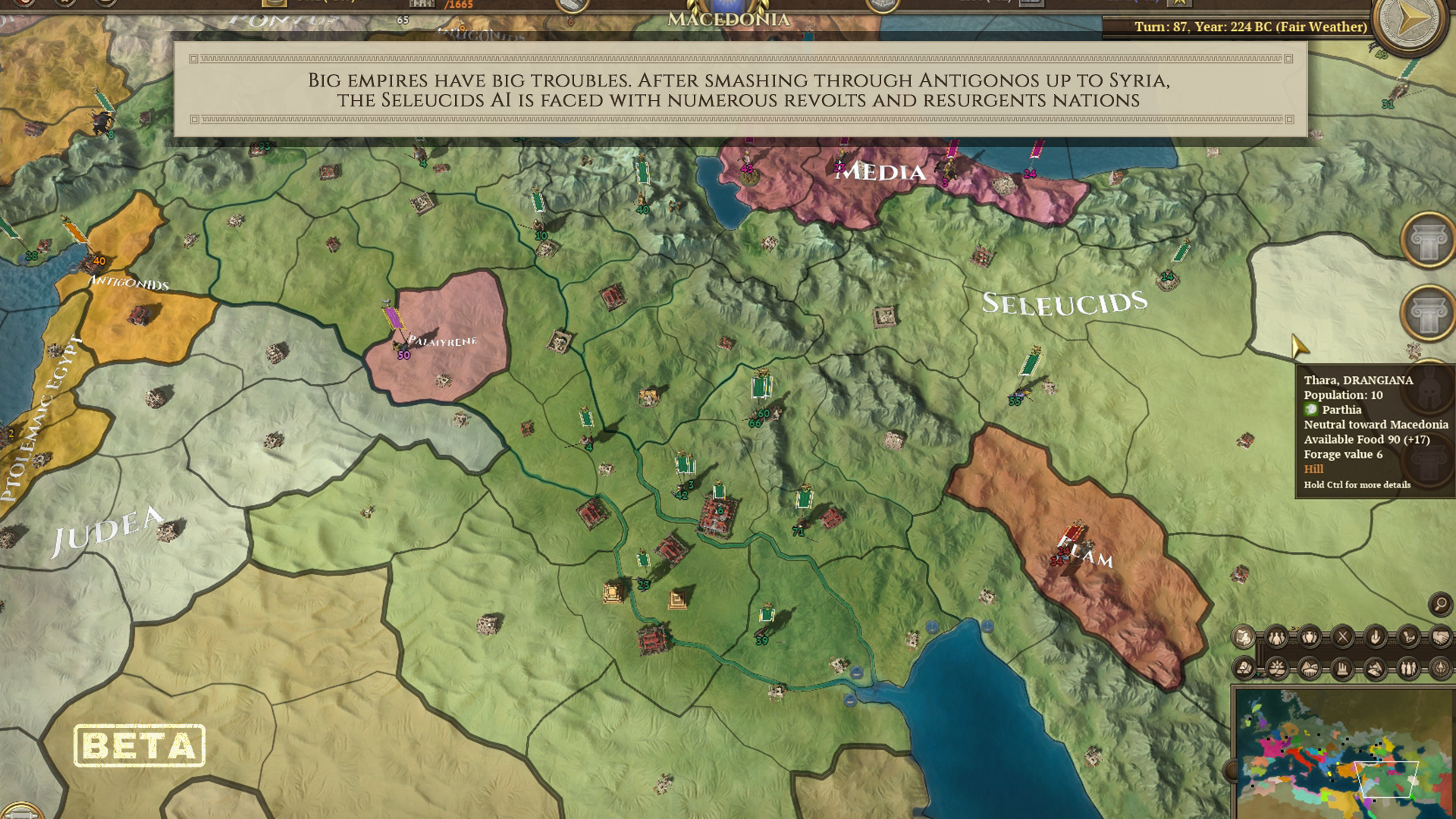
This is what we aim to simulate, albeit in perhaps a gentler, less frustrating way, in Empires! We want you to consider, seriously, that your nation is a complex, fragile construct. If you manage it well through several simple yet subtle mechanisms, then -- most of the time – things will be all right. If you throw caution to the wind, by conquering rabidly and neglecting the welfare of your citizens, then there will be an internal reaction that sends your nation into turmoil and revolts.
Ok after this long preamble focusing on the core design principle, let’s get practical! One of the very important measures of the progress of your nation is the Culture of each region. It comes from assigning your population to the Culture task, supplemented by your buildings. As with other types of ‘production’, this can be further modified by traits at the national level, from your ruler, government, etc. At the national level, there can also be events that change how much culture you generate. An artistically minded ruler can lead to benefits across the nation.
Culture is pivotal to the game, because it serves many purposes. The most straightforward and direct usage is ‘welfare’, a bonus to loyalty, which you get if you have population assigned to Culture production. Thus you can offset unrest by placing your population in ‘unproductive’ (compared producing food or money) activities. There is a limit to how much bonus to loyalty you can get from welfare, so this tool has its limits, but it works well as a ‘first line of defense’ against discontented and demanding citizens.
Because, as you might have guessed, citizens, and population in general, are not always fully happy with their condition. The more numerous the population of a region is, the lower the loyalty will be, due to citizens expecting services, welfare and entertainment. Slaves bring different challenges in this respect compared to citizens. They, oddly enough, want to change their condition by revolting, or at least escaping. This too lowers the overall loyalty in the region. And when loyalty is too low, you can get revolts, either from the slaves, or from the citizens. They might even turn back to their former nation or master, if they are not from your main ethnicity. People are so ungrateful!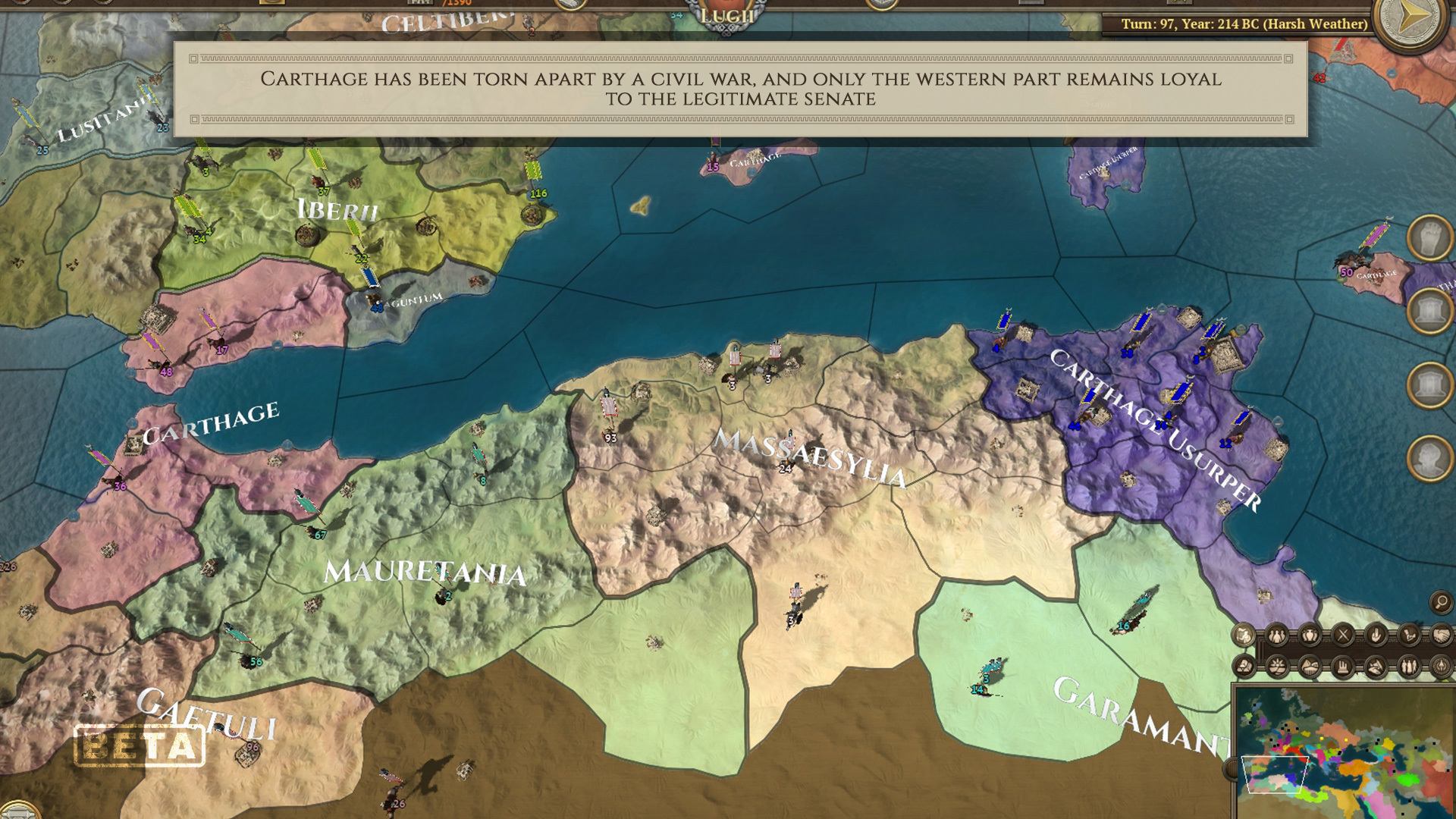
The second, slightly less direct use of Culture, is to fight off Decadence. Decadence in the game appears under several conditions. First, as your government grows older, some decadence appears over time. Second, when your nation grows and conquers other people, you get extra decadence, coming from the turmoil and instability of having to assimilate new territories. And then you have what your nation is made of, its infrastructure. Some buildings are very nice and will greatly help you, but they come with the cost of generating decadence over time.
And so, you have on one side the overall culture of your nation, and on the other side its decadence level, giving you a ratio between them. If the ratio is good, you are a nation that is progressing in terms of civilization.
This ratio is compared to all the other nations in the game and will place you into one of three ‘tiers’. At the top, you have momentum and perhaps you might even be qualified as being glorious, like the ‘Glorious Roman Empire’. Then there are other nations that are in the middle of the chart. For them, nothing special. They can go either way. And then there are the ones losing ground, in term of progress. For those in the bottom tier if they do nothing to deal with their problems, bad things will happen.
All of these effects are very gradual. You don’t switch from being a young and dynamic empire to a crumbling kingdom made of senile senators and pampered citizens in a few years. You’ll have time to react and adjust, but doing so may demand considerable effort though!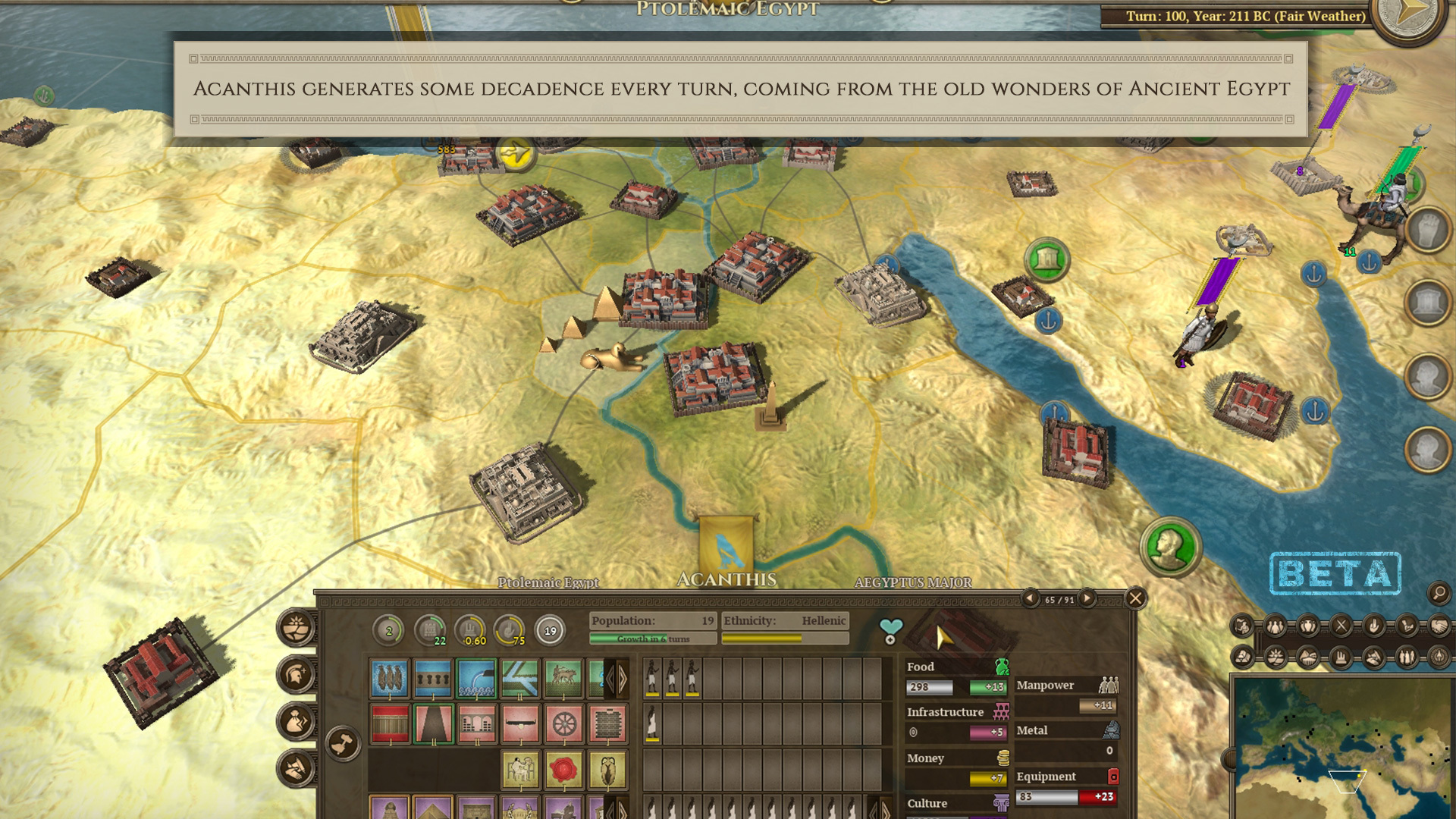
All this leads to the status and civilization level of your nation.
Your status can be ‘young’, ‘stable’, ‘glorious’, ‘old’ or ‘decadent’. Civilization level gives the tier of your government. For example the Republic is a civilization level II government, as is the Monarchy. And an Empire is a tier III government. Status and Civilization level are combined, depending of your progress in civilization and how decadent you are. It is entirely possible to be the ‘Glorious Roman Republic’ but later on the ‘Decadent Roman Republic’. It will depend on how well you handle the progress and decadence of your nation.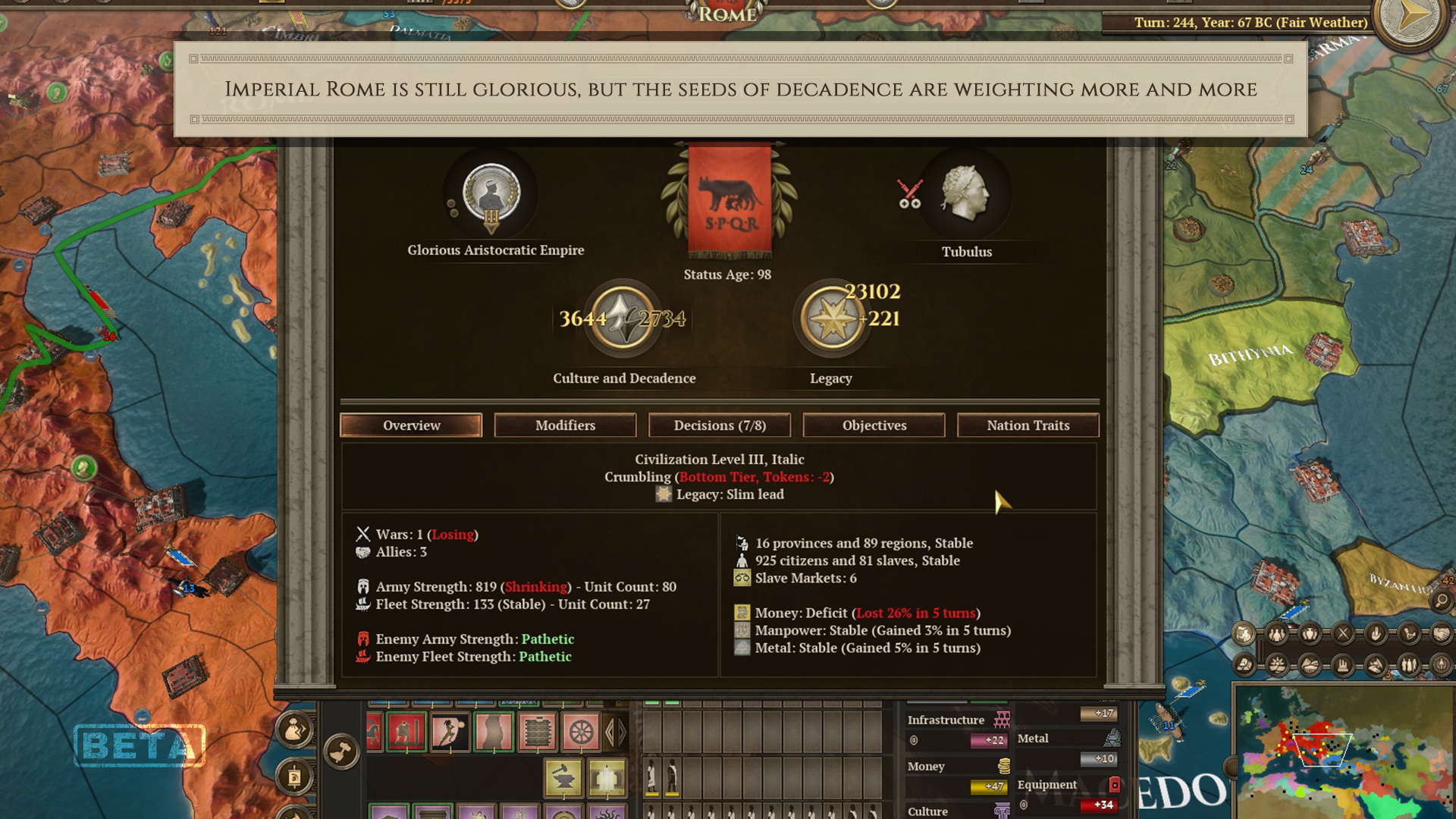
There are rewards from being a nation progressing through the civilization levels. As time passes, if you maintain a glorious status long enough, then you might evolve to a new civilization level. And this is how the Republic might transform to an Empire for Rome! And then if you are already at the top civilization level, being again Glorious has its own reward, with the fabled Golden Age!
So we talked about how nice it is to have significant culture in your nation. We also spoke of Decadence and how it is gained. Rest assured, you also have some tools to remove decadence, even if they are rarer. First, when you manage to make your nation evolve, moving from young to stable, or even from a civilization level to another, you remove half of the accumulated age of your government, which automatically will remove quite a lot of decadence. Then when you conquer a region, over time turmoil will recede and this will in turn remove some decadence. And then a few buildings will remove decadence over time, like an Academy for example. But for the most part, the more powerful buildings tend to have some drawbacks…
This is where we have almost come full circle back to our loyalty issue we talked about initially (as you can see the game features mesh with one another). It won’t be possible, if you want large populous regions, to fight off disloyalty only with the welfare bonus from culture. You’ll need something else. It happens that we have a lot of buildings in the game (400). Several of these (circuses, gambling rings, theaters, noble districts, brothels, monuments, gladiator arenas, etc) will greatly boost loyalty in your region. In a very ‘panem et circus’ way of the Romans (we want bread and games!). The only issue with these buildings is that they generate decadence over time. And so we are back to the problem of fighting off decadence.
We said earlier that we did not want to be too punishing and frustrating, it’s a game after all. Depending of your difficulty level and rate of expansion, it will be entirely possible for a player paying some attention to his empire to avoid the more acute crisis that struck the roman empire (civil wars mainly). But you’ll have to make choices and be watchful of your expansion rate and how your citizens feel. Failing that, a usurper is always around the corner!
As you can guess the AI nations too are subject to this ebb and flow of progress and decadence. This makes for a rather dynamic map where empires expand, splinter and reform. Some nations can even be reborn because their old master is crumbling in decadence! So there are opportunities to grab desirable regions, if you see that your neighbor is rife with internal problems…
. Field of Glory: Empires - Ask Us Anything - We are LIVE:
https://www.reddit.com/r/Games/comments/bs3z4v/ama_i_am_philippe_ma.... Field of Glory: Empires Dev Diary #4 - Commerce and Trading:
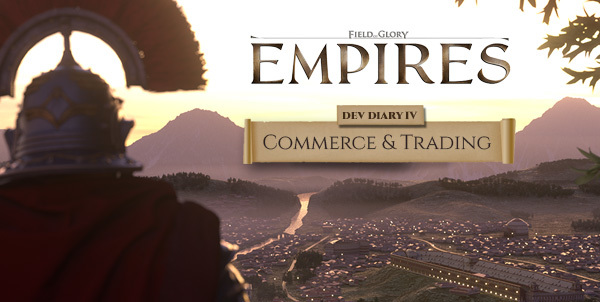
Welcome to the fourth installment of the Empires dev diaries. This week, we will talk about trading and commerce, and how buildings are very important in relation to this.
As you might remember from our previous diary on buildings, they provide a lot of opportunities and benefits. But many will need trading goods to work to their full capacity. They will still function even if the trading good is not available, but you’ll pay a hefty sum each turn, to simulate the convoluted ways by which you manage to get a trickle of the precious trade good. For some buildings, this is sometimes worthwhile as they might be instrumental in how you have setup your empire, but in other cases you will be better to disable or destroy the building.
So … trade goods! There are a lot around, something like 50 or so. Some are naturally produced in regions, and you don’t have to do much to gain access to them, even if by themselves they won’t generate any benefits (you would still need an appropriate building for that). Here, we are talking of wood, stone and the like. Some are manufactured, like pottery, clothes, weapons, sails. And a third category are imported resources, which are produced by another region or country (although as you can guess, these too are either natural or manufactured).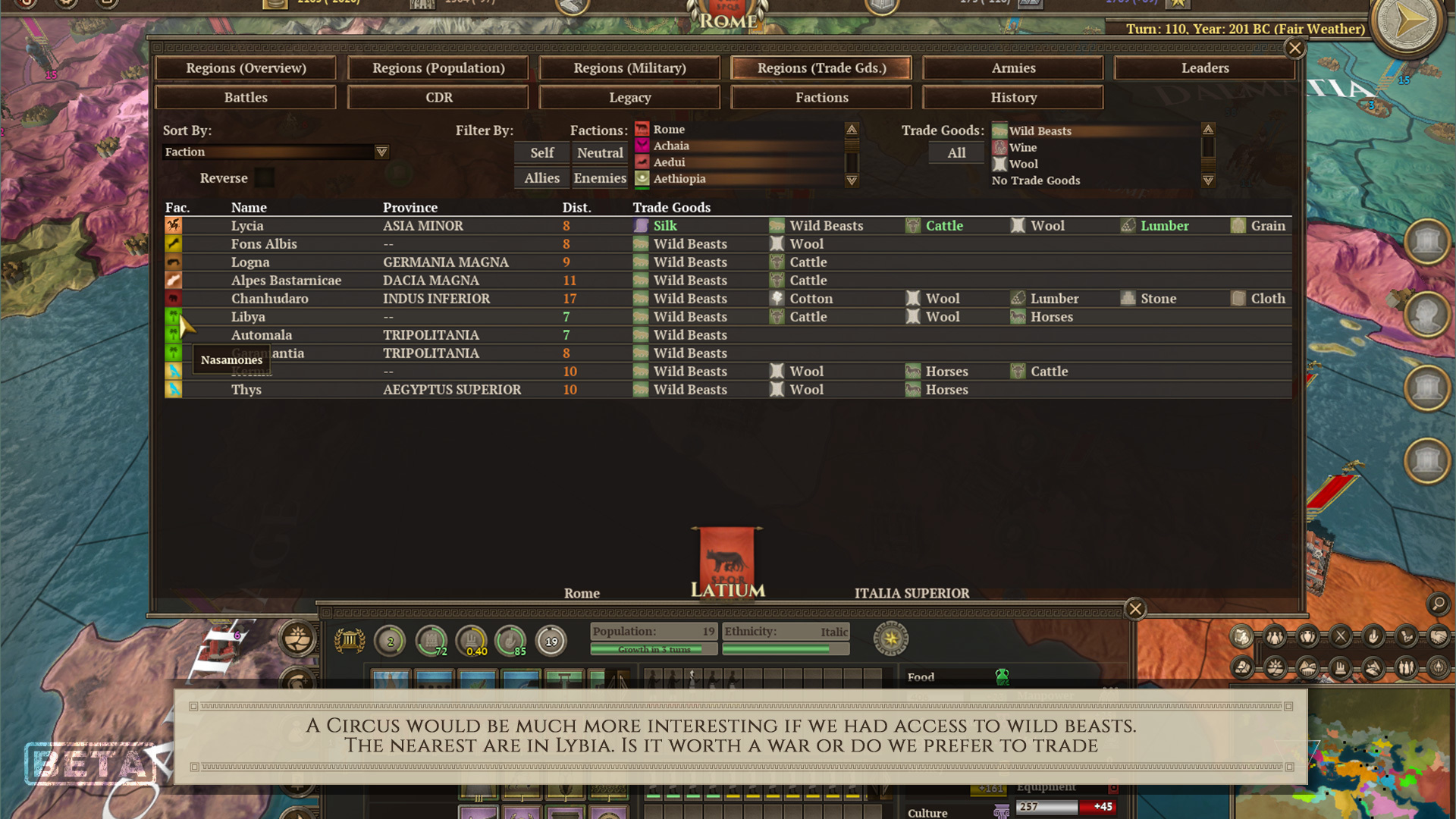
Buildings will often need a trade good. Some good examples would be a spinning mill, in need of cotton (or flax). A mint would need gold, and stables would need horses. This will generate trade between your region, where the structure is, and an exporting region. And, depending of how good your nation is at commerce, the exporting nation can be a neighbor, someone on the other side of the sea or one of your own regions (if it has the trade good obviously). The whole process is automated, and you don’t have to worry about who can provide what, as given the scope of the map and the possible size of your empire, this would become daunting to handle, and then, to put it simply, a source of tedium. Now, we did not say it was done randomly. There is a measure of your trading efficiency, named ‘Trade Acumen’, which will be used when there is competition between several potential sources of supply. As you can guess, your internal trade is much favored here, as well as trade with your allies. But sometime, a powerful trading nation, like Carthage, will literally snatch trading opportunities and get richer from doing this. And that’s how you end up with Carthaginian olive oil in Rome while some Sicilian farmers are discontented!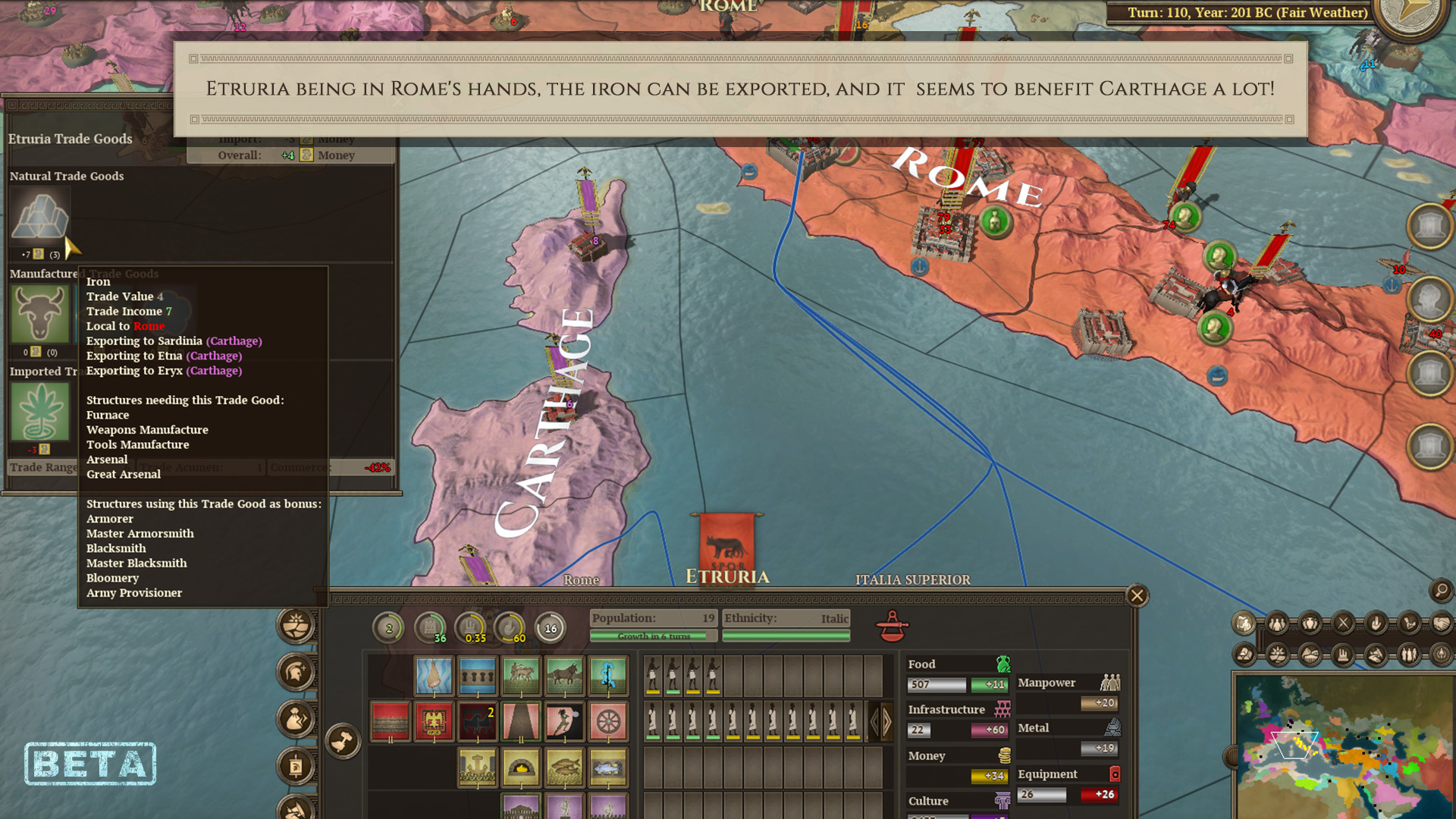
Trade Acumen is something you can improve though, either at your national level, with the right decisions and a proficient ruler, or at the local level, by building trade ports, paved roads, trading centers. All in all, trading is a smooth process in which you can gain significant money, while providing your buildings with what they need. Now, sometimes, trade is not a possibility or is too difficult to achieve, so you’ll want to inspect the ledger and see where the nearest source of iron is and then snatch it from the hands of its current owner…
You might think that’s all about trading, but definitively no! Because having a good availability of trading goods is much more useful than just having your buildings work without an extra fee. Trading goods also play a very important part in what the buildings will themselves produce. This is done through the mechanism of bonus trade goods. An example will probably be the quickest way to convey how it works.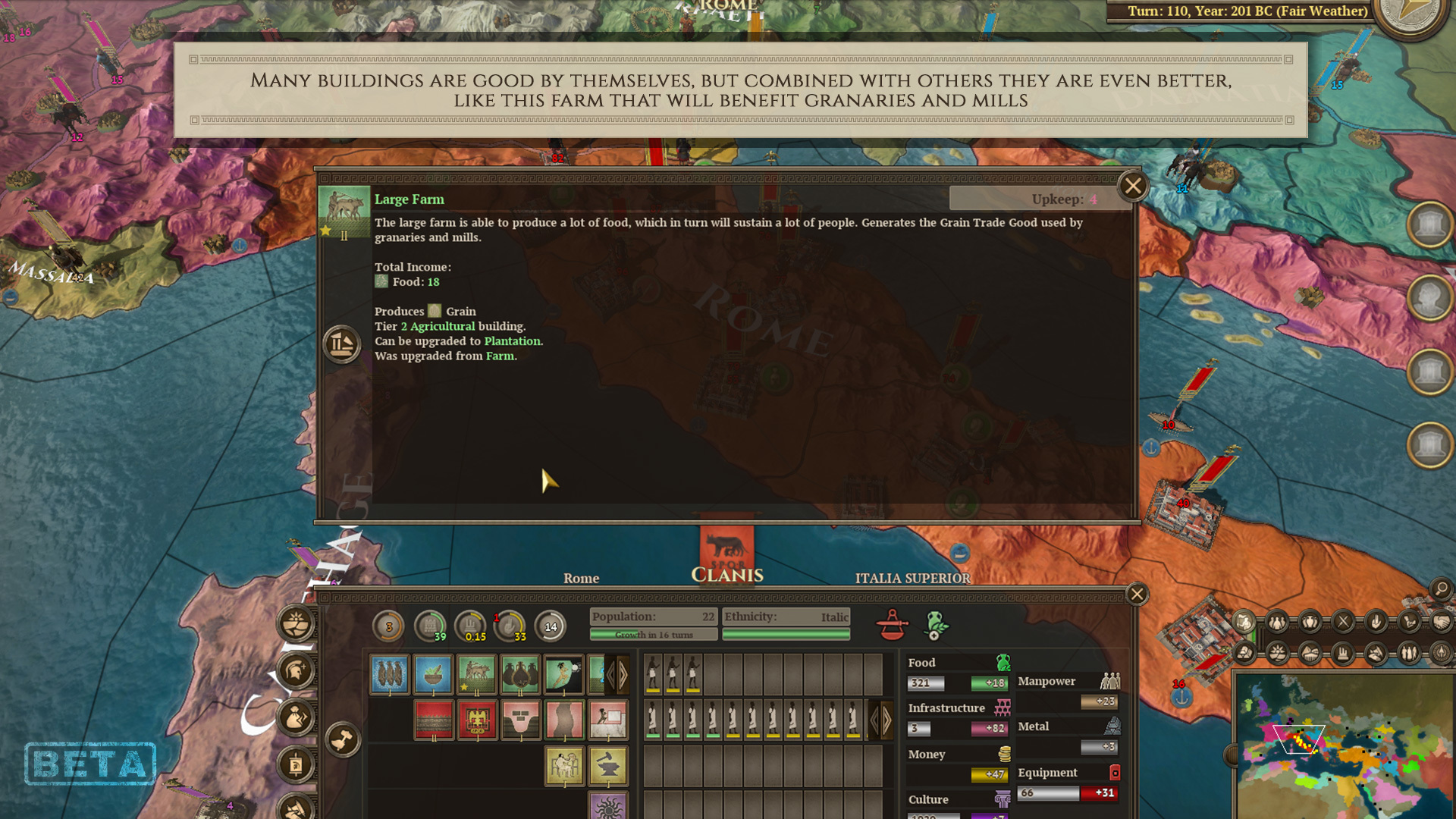
Let’s take a fairly advanced building, the Thermes, in which your citizens will wash, relax and gossip. The Thermes are a healthcare building, and as such give a health bonus in the region, which speeds up population growth while protecting (partially) against diseases. By itself it requires no trading good to work smoothly. But, should you happen to have, either in the region it is in, or an adjoining region, marble or perfume, then you’ll gain extra culture and money from the building, as it operates much more efficiently, being now so beautiful and sophisticated! So playing and optimizing these bonuses, although definitively not mandatory to get a good game and win, is one way of getting the most out of your nation. And this might be mandatory, if you like to play at a high difficulty level or against live opponents. For some, this will be the pleasure of enjoying the ‘mind game’ that this kind of gameplay demands, finding the right supply chain and combining buildings so that one needs a resource that will then be further used by another, etc. A game in a game, for those minded to paying close attention!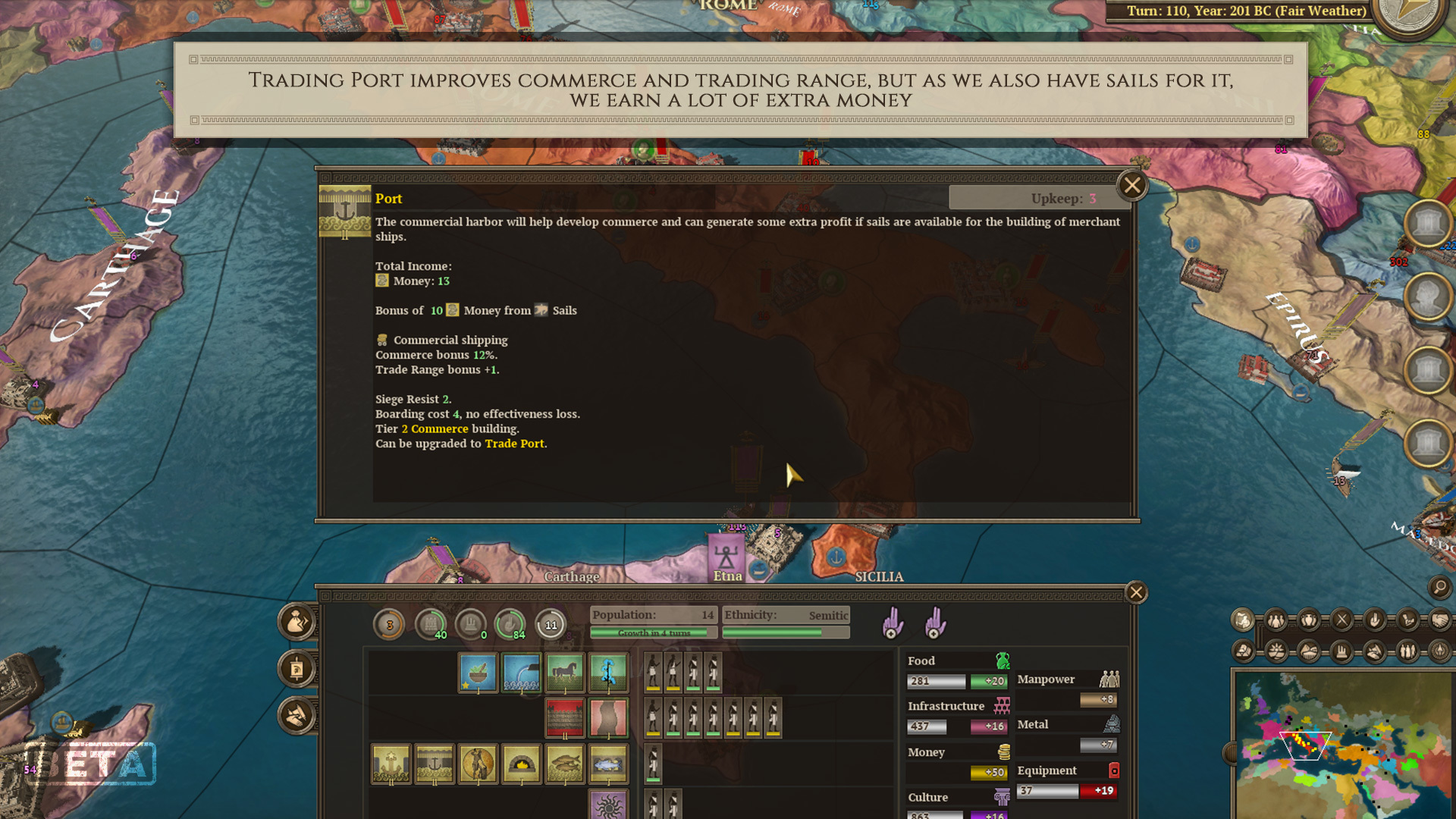
And so, to sum up, the surface of trading and commerce will feel simple and easy for newcomers, and it is, as everything works by itself. But when you start delving into the numerous buildings, the goods they need and the goods that would provide extra bonuses, you get a quite rich system, strongly tied to the general economy.
Tokavuh Stream Control Download] [FULL]
HomeGrove Torrent Download [Crack Serial Key
Blocks That Matter Crack Serial Key keygen
Playing Hard download android
SUPERVERSE Download
Epic Food Fight Demo Activation Code
The Settlers 7 : History Edition full crack [portable edition]
SEGFAULT download for pc [crack]
24 Hours 'til Rescue crack only
Echoes of Aetheria: Soundtrack full crack [Password]
© 2024 Created by PH the vintage.
Powered by
![]()
You need to be a member of On Feet Nation to add comments!
Join On Feet Nation